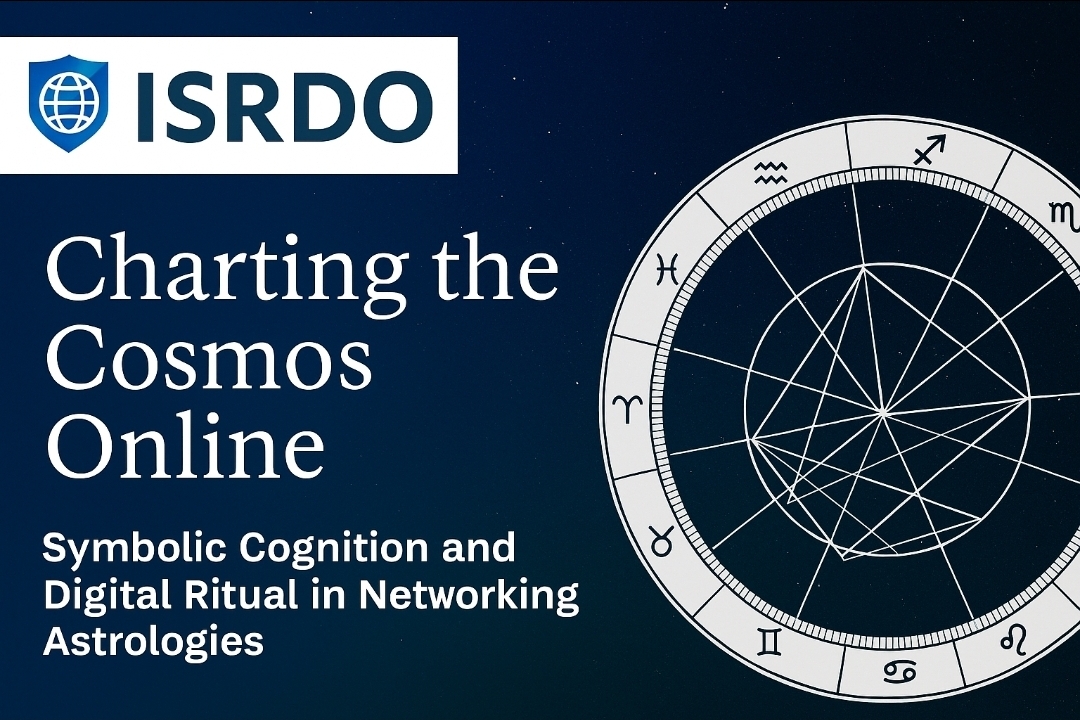
Charting the Cosmos Online: Astrology as Lived Contemporary Esotericism in Digital Communities
Title
Charting the Cosmos Online: Astrology as Lived Contemporary Esotericism in Digital Communities
Author
1. Mohammad HekmatAfshar, Student, Göteborgs Universitet, Sweden
Abstract
Symbolic Ritual
This essay examines how esoteric information is being disseminated and reproduced in virtual spaces through examining the media practice of modern astrologers. It centers on a tutorial video by Kapiel Raaj, a popular Vedic astrologer on YouTube, and challenging it to practice by Chani Nicholas, who combines astrology with feminist and therapeutic terminology on Instagram and her smartphone app; the work explains how new cosmologies are made readable. Both of them depict astrology as a practice of lived esotericism, expressed through metaphorical systems, interactive formats, and personal empowerment. Building on Kennet Granholm's book, re-enchantment thesis of late modernity and adopting user engagement witnessed on Reddit forums like r/AskAstrologers, this article positions astrology as a digitally mediated experience based practice. This study adds to the study on esotericism through a comparative, media sensitive examination of how online astrologers make spiritual meaning and authority within emerging digital subcultures.
Keywords
Conclusion
Astrology, when accessed via the digital media, is a hybrid discourse that blends symbolism, self management and social practice. All these various types of media, from extended speeches to short symbolic cues, demonstrate how astrology has evolved into a digitally mediated, participatory occult culture. No longer an immutable tradition or a mere fad, astrology is now a practice that enables individuals to build meaning in individual and interrelating ways. Each platform shows this in different ways. Kapiel Raaj's lessons use images and simple language to present Vedic astrology as understandable and useful. Astrological ideas are synthesized by Chani Nicholas and incorporated into investigations of the self and agency. Rick Levine and Jessica Lanyadoo focus on self reflection and common symbolic meanings, while Reddit groups develop interpretations together.
The findings are consistent with Kennet Granholm's perception that esotericism is not a fixed belief but a dynamic ideology conditioned by media and culture. Granholm prescribes astrology as a means of discovering awe in a world lost to it. Partridge supports this perspective by asserting that the cultural force behind the West's re-enchantment is occulture. This occultural re-enchantment is best illustrated by the symbolic language of astrology and its participation media rituals. Esotericism offers its forms as means of managing crises, identity problems and emotional struggles. Both social life on Reddit and Instagram fit Campbell's description of religious communities as activist participants who fashion new media to voice their spirituality in language of belief and history. This distributed participation counters the hierarchical initiations in esotericism. The merging of esoteric imagery with aesthetic cues in Instagram posts, such as hashtags, moon ceremonies and affirmation slides, shows what Birgit Meyer calls aesthetic formation: the shared visual and symbolic language that unites groups. Astrology is evolving from a belief system to a digitally practiced culture. According to this study, those who are emotionally conflicted and torn between sarcasm and sincerity, myth and remedy, are more likely to engage in online esotericism. Short movies, like YouTube Shorts, typically combine ceremonial signs with humor. All its humor aside, the adage illustrates how astrological symbolism is being recontextualized in online culture as ritual and parody, broadening its range of expression. For instance, Mercury in Retrograde Made Me Do It, is the video im which the user humorously remarks, "Mercury retrograde made me ghost you. It's the universe, not me", reinterpreting astronomical transit as a humorous yet symbolic excuse for taking action. Luhrmann contends that esotericism is not rendered worthless by the intersection of ritual and parody. Instead, it expands its expressive capacity, resulting in novel ways to participate emotionally and symbolically. She refers to this interpretational drift as: As people continue to interact with symbols in novel ways, their beliefs shift.
Astrologers now are influencers, therapists, mystics and teachers, which are indicators of the blending of the spiritual and commercial realms. Apps, subscription and coaching turn spiritual understanding into something to buy and sell, but also disseminate it more. Authors like Jeremy Carrette and Richard King say we should consider this and not look at it as a bad thing, but rather an advancement of how spirituality and politics intersect in the arena of money.
To sum up, the ongoing popularity and changes in astrology within digital culture show that esotericism is adapting, not declining. Its shared metaphors on social platforms become tools for expressing identity, therapeutic engagement and relational meaning. This research adds to the academic field by supporting this idea with actual, participatory examples, showing astrology as more than just content; it's a mediated ceremony, a metaphor-rich culture and a practiced form of esotericism. This research suggests a change in how esotericism is shared and done. Astrology works as a link between symbols, bodies, platforms and imagination. Since online rituals are common, esoteric ideas are now found in comments, emojis and algorithms. Experts should study esotericism as a changing tradition shaped by symbols and rituals instead of old teachings.
The integration of astrological meanings across different media platforms, is a pattern in the ethnographic data. People who practice or follow astrology, use apps, newsletters, blogs, videos and memes. These platforms create symbolic experiences where formal learning combines with personal ritual. This resonates with Catherine Bell's argument that ritualization is rather not an action but a vehicle to empower a form. Individuals know that some posts function more as spiritual enactments than predictive statements. Platform diffusion is hard to research. When rituals are posted on platforms, traditional ways of considering sharing and truth must be realigned. Egil Asprem explained that esotericism online consists of bits of knowledge. Individuals integrate astrology into self help or emotional practice. This varied pattern of participation signals a rise in specialized practices, not a drop in importance.
It also questions standard ideas about who is an expert. Astrologers such as Rick Levine and Kelly Surtees keep their symbolic power because they have been around for a long time and are consistent in their work. Others, such as meme astrologers or YouTube stylists, gain power through how they look, their skill in understanding emotions, or their ability to tell stories in an interesting way. This is similar to what Christopher Partridge describes as occulture: an informal space where specialist symbols are exchanged in popular culture. While significant, they're not academically studied. In order to grasp the way esotericism is experienced nowadays, we must consider how metaphorical authority and cultural resonance operate on the internet. Plus, the spread of astrology into discussions of identity, mainly among feminist, queer and BIPOC astrologers, shows a key reclaiming of cosmic structure. Astrological symbols, which used to belong to hierarchical metaphysics, are now seen as ways to resist, heal and remember ancestors. Authors such as Wouter Hanegraaff understand esotericism to be the coming back of knowledge previously rejected. These days, this recovery assumes political significance. Mercury appears as trans icon, the Moon as queer tenderness, and Saturn as resistance to colonial exhaustion. Astrology in the contemporary digital age is more about reclaiming symbols and stories than foreseeing. Individuals apply it to guard against systems that have rejected or disapproved them, to translate who they are and to heal.
It is also to be noted the appearance of another form of realism amidst esoteric practices. While some online astrology is lighthearted, many who practice it are truly dedicated to ethical behavior, spiritual duties and practical rituals. This goes against arguments that view online esotericism as just a superficial show or attention seeking by influencers. As Tanya Luhrmann wrote, religion isn't necessarily communicated in tough doctrine; rather, it develops through routine practice and imagination. Astrologers that offer daily advice, hold monthly new moon rituals or prompt reflection upon planetary issues do more than establish a brand; they offer mini initiations via cyber space. These "mini initiations" are repetitive symbolic rites that are micro rites and encourage spiritual continuity in the virtual existence, such as horoscopes, lunar rituals or journal exercises.
Astrology provides us with myth when we possess much information, symbolism if read literally, and community when we feel solitary. Its world view fulfills a persistent human need, to order chaos, control of the stars and significance in the sky. Additional research can explore how other astrological systems diffused through analogous symbolic systems or how mobile platforms transform ritual continuity and esoteric identity.
Author Contrubution
The author conceived the study, designed the research framework and conducted the digital ethnography and critical discourse analysis. The author also collected and curated all source materials, performed the analysis and interpretation, and drafted all sections of the manuscript and approved the final version for submission.
Funding
This research was conducted without external financial support. The author affirms that no funding was received from public, commercial, or not-for-profit agencies for the design, execution, or publication of this study. While the project was undertaken independently, the author may have accessed scholarly resources through student privileges at the University of Gothenburg, including digital databases and library materials not freely available to the public. These resources were used solely for academic purposes and did not constitute formal institutional sponsorship or directed funding.
Conflict of Interest
The author declares no competing interests or financial relationships that could influence the research or its presentation.
Data Sharing Statement
This study draws primarily on publicly accessible digital content, including YouTube videos, podcasts, blogs, and social media posts produced by named practitioners. All referenced media were available at the time of research without paywall or login restrictions, and are cited with direct links where appropriate. No private user data or proprietary platform analytics were collected or analyzed. The author acknowledges that some secondary scholarly resources—such as journal articles, books, or database entries—may have been accessed through institutional privileges at the University of Gothenburg. These materials were used solely for academic interpretation and citation, and may not be freely available to the public. No restricted datasets or confidential archives were employed. The study complies with ISRDO ethical standards regarding transparency, citation, and data accessibility.
Software And Tools Use
This study was prepared using WPS Word and Microsoft Word for document composition and formatting. AI-assisted tools were employed for language refinement, citation alignment, and formatting verification. All intellectual content and scholarly analysis remain solely the responsibility of the author.
Acknowledgements
The author declares that no acknowledgments are applicable for this study.
Corresponding Author
Copyright
Copyright: ©2026 Corresponding Author. This is an open access article distributed under the terms of the Creative Commons Attribution License , which permits unrestricted use, distribution, and reproduction in any medium, provided the original author and source are credited.
HekmatAfshar, Mohammad. “Charting the Cosmos Online: Astrology as Lived Contemporary Esotericism in Digital Communities.” Scientific Research Journal of Arts, Humanities and Social Science, vol. 3, no. 2, 2025, pp. 1-22, https://isrdo.org/journal/SRJAHS/currentissue/charting-the-cosmos-online-astrology-as-lived-contemporary-esotericism-in-digital-communities
HekmatAfshar, M. (2025). Charting the Cosmos Online: Astrology as Lived Contemporary Esotericism in Digital Communities. Scientific Research Journal of Arts, Humanities and Social Science, 3(2), 1-22. https://isrdo.org/journal/SRJAHS/currentissue/charting-the-cosmos-online-astrology-as-lived-contemporary-esotericism-in-digital-communities
HekmatAfshar Mohammad, Charting the Cosmos Online: Astrology as Lived Contemporary Esotericism in Digital Communities, Scientific Research Journal of Arts, Humanities and Social Science 3, no. 2(2025): 1-22, https://isrdo.org/journal/SRJAHS/currentissue/charting-the-cosmos-online-astrology-as-lived-contemporary-esotericism-in-digital-communities
9474
Total words3012
Unique Words463
Sentence20.211663066955
Avg Sentence Length0.25542069641422
Subjectivity0.044611534973306
PolarityText Statistics
Viewed / Downloads
Total article views: 279 (including HTML, PDF, and XML)| HTML | XML | Total | |
|---|---|---|---|
| 191 | 55 | 33 | 279 |
Viewed (geographical distribution)
Thereof 279 with geography defined and 0 with unknown origin.
